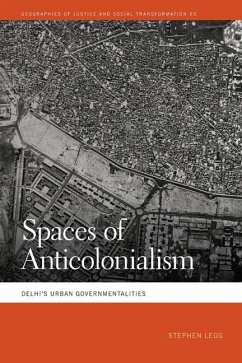Spaces of Anticolonialism: Delhi's Urban Governmentalities provides a spatial analysis of the anticolonial governmentalities that emerged in the colonial capital of British India. Reading across imperial and nationalist archives, newspapers, memoirs, oral histories, and interviews it exposes the subaltern geographies and struggles which have traditionally been overshadowed by the presence of national leaders in Delhi. It reads the new capital and the old city as one interconnected political landscape and tracks the efforts of the Indian National Congress to mobilise and marshal support for the mass movements of Civil Disobedience (1930-34), Quit India (1942-43), and beyond. This bottom-up analysis, focused on the streets, bazars, neighbourhoods, homes, and undergrounds of the two cities, emphasises the significance of the articulation of physical and political space; it highlights the pioneering role of women in crafting these spaces; and it exposes the micro-techniques that Congress used to encourage Gandhi's nonviolence. Michel Foucault's final lectures on parrhesia (courageous speech and actions) are used to analyse these spaces of anticolonialism as coherent governmentalities which were themselves rejected by those who turned to violence in the years before independence in 1947. This volume provides an innovative study of anticolonial geography and a restive history of the capital of contemporary India's 1.4 billion people.
Hinweis: Dieser Artikel kann nur an eine deutsche Lieferadresse ausgeliefert werden.
Hinweis: Dieser Artikel kann nur an eine deutsche Lieferadresse ausgeliefert werden.









